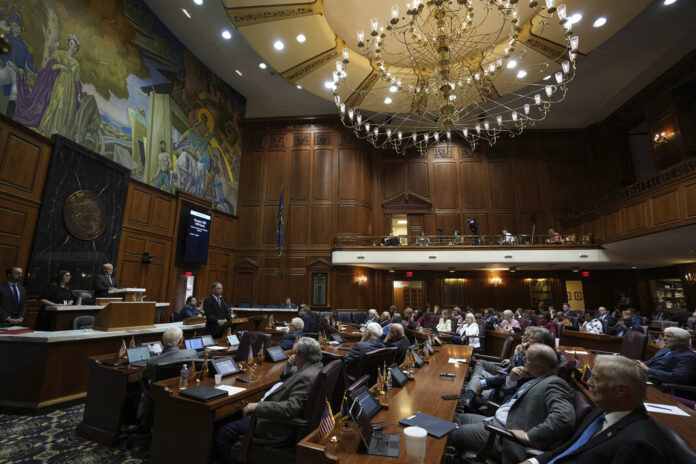INDIANAPOLIS — The Indiana House Courts and Criminal Code committee moved an amended abortion ban bill to the full House by a vote of 8 to 5 Tuesday night.
The House convened shortly after the committee vote Tuesday night and Republicans there denied a motion from Democrats to move the bill to the public health committee, where physicians are part of the panel.
Rep. Ryan Lauer, R-Columbus, and Rep. Sean Eberhart, R-Shelbyville, voted against the motion and both voted for adopting the committee report to the full House, bypassing the public health committee. The House will now plan to convene at 9 a.m. Thursday to consider the bill.
The committee changed the abortion ban proposal narrowly approved over the weekend by the Republican-dominated state Senate. The committee broadened the language to include an exception allowing abortions to protect the health of the mother and adjusted the time frame when abortions would be permitted in cases of rape and incest.
Republican Rep. Wendy McNamara of Evansville, who is sponsoring the bill, outlined the exceptions to protect the physical health and life of the mother, a frequent request among doctors and others testifying before a Senate committee last week. The amendment also would allow abortions if a fetus is diagnosed with a lethal anomaly.
It additionally removes the Senate-approved time frames based on age for abortions in cases of rape or incest — up to 12 weeks for those under 16 and eight weeks for those 16 and older. The House version, instead, would create a blanket ban after 10 weeks post-fertilization on abortions in cases of rape and incest. Victims would also no longer be required to sign a notarized affidavit attesting to an attack.
Amendments considered in the committee to move back implementation of the abortion ban to Nov. 1, to require a medical review committee of medical professionals who would hear complaints in a screening capacity, and other changes, were voted down largely on a party line vote with most Republicans voting no.
The Republicans on the committee rejected a requested amendment from Democrats to allow pregnancy accommodations to be required of Hoosier employers, since the bill will result in more pregnant workers, something Indiana does not have. It too was rejected by Republicans.
Democrats pointed out the dismal state of maternal health in Indiana, including the state’s high maternal death rate and high infant mortality rate.
Several dozen people on both sides of the abortion debate filled a Statehouse corridor outside the six-hour-plus committee meeting, where chants such as “safe and legal” from abortion-rights supporters could be heard inside.
Dr. Daniel Elliott, representing the Indiana chapter of the American College of Emergency Physicians, told the committee that the group worried that a broad abortion ban could allow prosecutors to second-guess the emergency decisions of doctors, leaving them exposed to criminal charges.
The House proposal would require the state medical board to revoke the licenses of doctors found to have performed illegal abortions.
“In emergency situations, physicians often work with a lack of complete information and must make quick decisions in the best interests of our patients,” Elliott said. “Overall, we feel like licensure and going to the medical licensing board is where the gray areas within medicine should lie.”
The Indiana proposal followed a political firestorm over a 10-year-old rape victim who traveled to the state from neighboring Ohio to end a pregnancy. The case gained wide attention when an Indianapolis doctor said the child had to travel to Indiana because a new Ohio law bans abortions if cardiac activity can be detected in an embryo or fetus, usually around six weeks of pregnancy.
Anti-abortion activists said they were offended that women from Ohio and Kentucky were coming to Indiana for abortions after strict laws took effect in those states following the U.S. Supreme Court’s decision overturning Roe v. Wade. They said Indiana shouldn’t allow any exceptions, arguing all abortions are “murder” and “evil” and that the state law declaring life begins at fertilization should be strictly enforced.
Jodi Smith, a lobbyist for the anti-abortion group Indiana Right to Life, said the organization remained opposed to the proposal because it is too lax. Smith said a signed affidavit should still be required for rape or incest exceptions and criticized the proposal’s language allowing abortions to protect the mother’s health as “very vague and poorly defined.”
“The concern is that will either open carte blanche of opportunity for abortion-minded doctors, or it could ensure that good doctors that need more clarity don’t know what the allowable procedures are, and they will hesitate,” Smith said. “Either option, it ends poorly for women.”
Republicans who control the Indiana House are facing similar disagreements over how strict the abortion ban should be after the bill cleared the Senate on Saturday in a 26-20 vote, the minimum number of votes needed to pass. A few Republican senators said they opposed the bill as written but wanted the bill to stay alive for consideration during the special legislative session, which must adjourn by Aug. 14.





